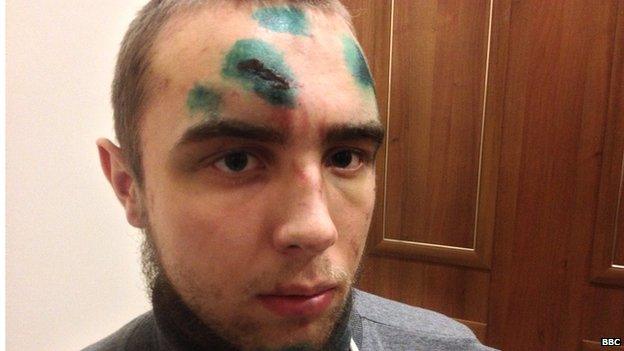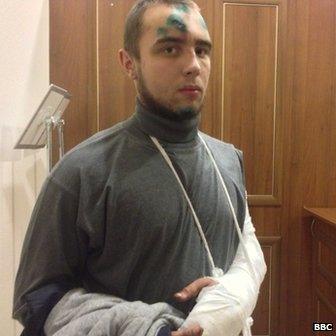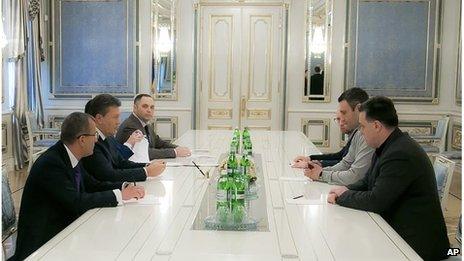Ukraine police tortured me, claims Mikhailo Niskoguz
- Published

Mikhailo Niskoguz, his cuts covered with a green antiseptic, says he was brutally beaten after being arrested at at demonstration.
A Ukrainian student has told the BBC he was tortured by riot police after being arrested during violent clashes in Kiev on Monday night.
Mikhailo Niskoguz says he was taking photos before being detained by police, beaten and cut with a knife.
Walking painfully and slowly across a hotel lobby close to Independence Square, 17-year old Mikhailo Niskoguz, speaks softly, recounting the beating he says he received at the hands of riot police.
Some protesters were stripped naked and beaten, as Daniel Sandford reports
"All I felt was pain. Their eyes were red, and when I looked into their eyes, I could see they were enjoying it," he says, wincing as he speaks.
His face and body is covered in cuts and bruises. He has a deep gash across his forehead, which has been treated with a green antiseptic fluid. His arm is broken and bandaged.
"The special forces took me. They beat me severely. They hit me with batons, cut me with a knife," he says.
The student had been visiting his grandfather, a priest, at the anti-government demonstrations in the centre of Kiev earlier in the day.

Mikhailo Niskoguz also says his arm was broken in the attack
He says he stayed on into the evening to take photographs as the stand-off between police and protesters around Hrushevskyy Street, turned violent.
He was close to a colonnade where protesters were throwing fireworks onto riot police, when he was arrested and taken to a nearby park.
"They undressed me. They made me walk naked," he says, describing how he says the police made him sing the national anthem before taking turns to beat him and slash him with knives in the freezing weather.
"They started cutting me across my anus," he adds. "They only called an ambulance after four hours."
He was eventually taken to hospital.
He was later taken to court where the police accused him of rioting and throwing fireworks at them - both of which he denies, insisting he was only taking photos.
He was released on bail.
Ukrainian MP Irena Seh told the BBC she was going to raise the allegations of torture with the government.
"He will go to the prosecutor's office tomorrow to file a complaint," she said.
The police press spokesperson in Kiev told the BBC they know nothing about any cases of alleged torture.
Ukraine's Radio Liberty, external has already reported claims that activist Yuri Verbitsky has been found dead, bearing signs of torture.
Verbitsky had reportedly been abducted earlier this week with activist Igor Lutsenko, who was later released and is said to be in hospital.
Ukrainian opposition leaders are due to meet President Viktor Yanukovych, two months since the start of the protests that have gripped Kiev.
One of them, former boxer Vitali Klitschko, has said he will lead pro-EU protesters "on the attack" if snap elections are not called.

After months of protests, President Yanukovych agreed to talk to opposition leaders, including boxer-turned-politician Vitali Klitschko (second right).
But he has also urged both protesters and police to refrain from further violence until he reports back.
Prime Minister Mykola Azarov said compromises "might be possible", but the opposition should avoid ultimatums.
Two activists were killed during violent confrontations with police in Kiev on Wednesday, the first fatalities since the demonstrations began in late November.
Prosecutors confirmed they had died from gunshot wounds.
One of those killed was identified as Serhiy Nihoyan, the 20-year-old son of Armenian refugees from Nagorno-Karabakh, who travelled from his home in eastern Ukraine in December to join the protests.
The other man was named as Belarusian citizen Mikhail Zhyznewski, who was at the protest with Una-Unso, a Ukrainian far-right group.
The authorities deny responsibility for the deaths.
They were the first fatalities since the anti-government protests began in late November over Mr Yanukovych's decision to pull out of a treaty building much closer ties with the European Union.
The centre of Kiev remains extremely tense. Barricades are still burning, billowing black smoke from the piles of tyres that now mark the front line between the riot police and protesters.